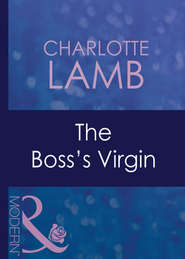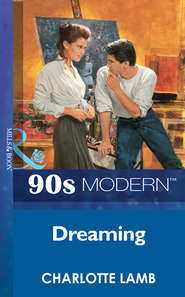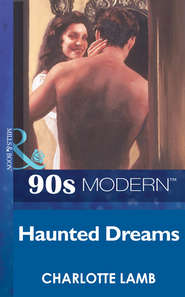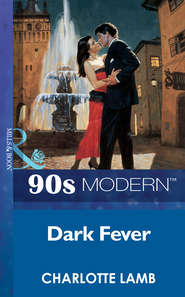По всем вопросам обращайтесь на: info@litportal.ru
(©) 2003-2025.
✖
Angry Desire
Автор
Год написания книги
2018
Настройки чтения
Размер шрифта
Высота строк
Поля
She had always been able to tell Paolo everything. At least she would be able to talk to him about what was tearing her apart, be open about why she could not go through with her marriage, knowing that he would understand. He was the one person in the world whom she had ever told about the past.
Paolo had lived next door to her when she was a child. He was four years older than she and had been a short, dark, silent boy, always painting and drawing and making clay figures. They had been thrown together because their mothers had been friends and neither of them had found it easy to get on with their own classmates.
Gabriella, shy and nervous, had found Paolo’s silences reassuring; he was sensitive and intelligent, and very different from the other boys in his class at school. They had mostly been bigger, cheerfully down-to-earth, and had made fun of his passion for art, despised him because he didn’t love football and fighting, and bullied him a little too. Paolo had kept away from them whenever he could; he had already had a sure sense of what he wanted and had known that it would take him away from Brindisi.
When Gabriella’s mother died, her grieving father had taken his daughter back to England so that he could be near his only living relative, his mother. Jack Drayton was himself a man in poor health; he had only survived his wife by three years and had usually been too ill to see much of his only child.
Gabriella had been sent away to boarding-school, although she’d spent her summers with her father’s brother Ben and his family. They had given her a couple of very happy years until it had all crashed down again. Sometimes she’d thought that every time she began to be really happy fate intervened—something always happened to wreck it.
Her uncle Ben had died suddenly the summer that she was fourteen. Afterwards his wife had sold their home, taken her children and gone back to Scotland, to the village where she had been born. After that, Gabriella had stayed with her grandmother, her father’s mother, in the summer.
During all those years, Gabriella had written to Paolo and got back scratchy little notes from him, but she hadn’t actually seen him again until he had come to England on holiday five years ago. She had still been at school, and was spending the holidays with her grandmother in Maidenhead on the River Thames—and she had been thrilled to see Paolo again.
He had stayed in London for a fortnight. Gabriella had shown him around, taken him to Windsor and Hampton Court, Kew Gardens and as far afield as Stratford-on-Avon, so that he could visit the theatre and see Shakespeare’s birthplace and Anne Hathaway’s cottage.
Paolo had just left art school in Milan and was going to be taking up a career in TV, set-designing. At twenty-one, he had been far more sophisticated and worldly-wise than the seventeen-year-old Gabriella, yet somehow they had picked up their brother-sister relationship where it had left off six years earlier without any difficulty.
When he’d gone back to Milan he’d rarely written. Neither had, but she’d known that when she saw him again they would still talk the same language—indeed, understand each other without words.
Smiling, she picked up the phone and dialled his number. The ringing went on for quite a while before his voice came on the line.
‘Sì?’ He sounded impatient; perhaps he was very busy.
‘Paolo?’ she whispered uncertainly, and heard his intake of breath.
‘Where are you?’
His swift reply told her a lot. ‘You know?’
Paolo didn’t bother to ask what she meant. His voice dry, he said, ‘He rang me last night. Even over the phone he was quite frightening. I don’t know what he does to you, but he turned my blood to ice. I got the distinct impression that if he found out I’d lied to him he would tear my head off my body and then dance on the rest of me.’
She half laughed, half sobbed. ‘How did he get your number?’
‘I think he was trying everyone you ever mentioned to him. No stone unturned, Gabi.’
She had known what he would do. Wearily she said, ‘I barely mentioned you to him.’
‘Mia cara, I was on your guest list!’
‘Yes, you were, but how did he find you so quickly? I gave him your address in Rome.’
‘Unfortunately, he—or one of his staff—knew I worked for TV in Rome, and tried them. Of course, they knew where to find me; I’d left my summer address with them.’
She sighed, closing her eyes. ‘Thank God I didn’t ring you before I left—at least you really weren’t lying when you told him you didn’t know where I was. Do you think he believed you?’
‘I think he must have realised that I was surprised. Yes, I think he believed I didn’t know where you were, but I may have spoilt the effect later—I lost my temper, I’m afraid.’
Anxiously she asked, ‘What did you say to him?’
‘I told him I wouldn’t tell him even if I did know where you were, but I hadn’t heard a word from you so I didn’t have to lie and I said that if you did get in touch I certainly wouldn’t tell him so he could shove off.’ Paolo sounded triumphant. ‘He didn’t like that, I’m glad to say. I did not take to him, mia cara—in fact, I disliked him intensely from the first word he uttered, and, whatever happened, I’m on your side.
‘Come here if you want to; I’ll give you sanctuary. You’ll be quite safe here—the grounds are patrolled by mad packs of hounds at night and the gates and walls are electrified—he won’t get in.’
Her pale mouth curved into a smile. ‘You’re a darling, Paolo. Listen, your phone might be bugged by now—he’s quite capable of it and he can afford to hire detectives who’ll do that. I’ll write. I’m OK, don’t worry. Bye.’
She hung up and lay staring at the ceiling. She would go down and get a postcard of the hotel; she had seen some on the reception desk. She would write a few apparently innocent words on it. ‘Having a lovely time, wish you were here!’ She would sign it, not with her name but with the word cara. It should reach him tomorrow. Paolo was quick-witted; he would understand at once and come to the hotel to find her.
She only hoped that Stephen had believed him and was looking for her somewhere else.
CHAPTER TWO (#ulink_da987ef6-66d4-5665-98b2-690b6b2ed9cc)
GABRIELLA woke next morning to the sound of a church bell chiming seven. An echo came from across the lake—or was that another church telling the hour? For a moment she lay there, dazedly remembering the incoherent dreams she had been haunted by all night—Stephen’s hard, dark face, his mouth, the heat of his body moving against hers, his hands…
Perspiration broke out on her forehead. With a low groan she sat up in bed and looked around the room. The walls were whitewashed. Last night they had looked rather stark, but this morning they were coloured pinky gold by the sun. She had not closed her shutters last night and had left the window slightly ajar; a gentle breeze was now ruffling the floor-length white gauze curtains.
Gabriella slid out of bed in her thin silky nightdress and walked over to the window, pushed it right open and went out on to her balcony, to be struck dumb by the beauty of the view.
She stood there, staring, blue eyes wide; she hadn’t expected anything like this. Her gaze moved over the ring of mountains, their indented line blue-hazed, majestic, stretching away out of sight, the morning light moving on their peaks where here and there snow still covered the upper slopes, a cloudless sky floating above them and below, on the surface of the lake, their shimmering reflections, white, gold and soft rose.
Como was not a huge lake; it had a domestic intimacy, and she could see the other side of it clearly enough to make out houses, red-roofed and white-walled, gardens with cypress and fir trees, and, on the winding roads along the lakeside, cars moving.
The hotel gardens ran right down to the lake to where she saw a wooden jetty, with a few people waiting on it—men reading newspapers, schoolchildren, women with shopping baskets chatting to one another. On the lake a small ferry boat was chugging towards them at a sedate speed. She watched it dock, nudging the old tyres tied along the jetty. A sailor tied up and the passengers boarded, greeting the jerseyed sailors on board like old friends—which they probably were.
The boat cast off again, crossing the lake again. Gabriella watched it leave. She could see why people who lived here would use the ferry if they wanted to cross the lake. Driving around those narrow, twisting little roads would be hair-raising even in daylight. That’s what I’ll do, she thought; I’ll leave my car at the hotel and explore the lake on the ferry.
She heard cheerful, murmuring voices outside in the corridor, then the whirr of the lift descending—other people going to breakfast, obviously—which reminded her that she had ordered a breakfasttray in her room for eight o’clock. Taking a last look at the view, she turned reluctantly away into her bedroom.
She showered, slid into a towelling robe hanging on the door and sat on the bed to blow-dry her long, silky hair; it took quite a time, so in the end she left it loose, to finish drying naturally, and dressed in a dark blue linen shift dress, leaving her slender legs bare but sliding her feet into white sandals with a tiny heel, a few fine straps of leather criss-crossing the foot, buckled at the ankle.
A few moments later the room-service waiter tapped on her door. He was a young boy in a spotless white uniform, as slender as a girl and doeeyed. He gave her an appreciative look, young though he was—he was, after all, an Italian and enjoyed the sight of a pretty woman. ‘Your breakfast, signorina,’ he said smiling as she admitted him.
‘Grazie,’ she said, leading the way out on to the balcony. In Italian she told him to put the tray down on the small white table.
‘A lovely morning for you,’ he said, as if he had produced that too. His dark eyes admiringly flicked over her from her black hair to her long legs. Clearly he was in no hurry to leave. ‘Is this your first visit to Como?’
‘Yes, and I’ve never seen anything so beautiful. Where does the ferry go?’ she asked, pointing to the jetty where a new string of passengers was boarding a different boat.
‘That one?’ He gave it an indifferent glance. ‘That sails between Menaggio, Bellagio and Varenna.’
‘Do all the ferries have the same route?’
‘Oh, no—some go right the way to Como itself, at the far end of one arm of the lake…’
‘One arm?’ she asked, puzzled.
‘The lake is a Y-shape, signorina.’ He pulled a pencil from his pocket and drew a rough outline on a notepad he also carried. ‘Like that. Como is at the end of this upper arm and Lecco is almost at the end of the other arm. The lake divides at Bellagio, then you come down here to Novate.’
‘What a strange shape for a lake! So which town is this?’











